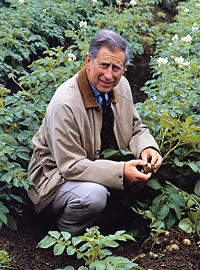The Issues
Prince Charles’ speech provides an insightful overview of the serious problems facing our current food system and a compelling vision for transitioning to a sustainable future. Here is our summary of the major themes of the speech, along with links to sources of additional information, and to some of the organizations and institutions working to address these critical issues:
A System in Crisis: Adverse impacts of industrial food production
Environmental Impact
Although industrial agriculture produces a tremendous amount of food, it is able to do so only by consuming vast quantities of scarce natural resources and by causing severe environmental damage. The industrial food system is also heavily dependent on fossil fuels (used to produce synthetic fertilizers and to process, package, and transport foods), consumes huge volumes of water, and degrades precious soil resources through monoculture (intensive, single-crop) production techniques that erode topsoil and dramatically deplete nutrient levels. The system also impairs biodiversity and pollutes water, air, and soil, damaging fragile ecosystems and threatening human health.
Social Impact
Throughout the world, the introduction of industrial agriculture has displaced small-scale farmers who practice traditional agricultural methods, decimating local economies and unraveling the social fabric of rural areas. By prompting a drastic reduction in the volume and diversity of local food production, the industrial food system has also forced increased reliance upon enormous, centralized agricultural operations and long-distance food transportation. This decreases our food security and makes global populations increasingly vulnerable to food shortages caused by volatile market prices and unpredictable growing conditions.
Resources
Sustainable Table
Pew Commission on Industrial Farm Animal Production
Food & Water Watch
Feeding the World with Sustainable Agriculture
Proponents of industrial agriculture falsely claim that this form of production is the only way to feed the world’s growing population. In reality, the industrial food system’s dependence on increasingly scarce natural resources and its vulnerability to the adverse impacts of climate change and other external shocks make it an unsuitable choice for the future. In contrast, a food system based on sustainable agriculture, which is inherently resilient and localized, could feed the world efficiently without impairing human health, depleting natural resources, or destroying the environment. Experts note that sustainable agriculture can also be incredibly productive; a 2008 report by the International Assessment of Agricultural Knowledge, Science and Technology for Development (IAASTD) concluded, based on the input of more than 400 scientists worldwide, that small-scale farming systems using agro-ecological approaches are among the most productive forms of agriculture in developing countries.
Resources
International Sustainability Unit
International Assessment of Agricultural Knowledge, Science and Technology for Development (IAASTD),
Agriculture at a Crossroads
Accounting for the True Cost of Food
An efficient transition to a sustainable food system requires a level playing field. Currently, industrial agriculture benefits from a variety of policies that encourage destructive industrial practices and make industrial foods seem less expensive than they really are. For instance, despite the many well-documented problems it causes, industrial agriculture is aggressively promoted by the US government through the subsidization of industrial crop production, extensive research support from land grant universities, and institutional procurement of industrial foods. Furthermore, as a result of insufficient regulation and inadequate enforcement, industrial agriculture generates substantial negative externalities (i.e., hidden costs of production) such as environmental destruction, damage to human health, socioeconomic degradation, and reduction of animal welfare. The cost of these damages isn’t included in the sticker prices of industrial foods at the grocery store, but instead is borne by society as a whole.
Unfortunately, these conditions conspire to undermine successful establishment of sustainable agriculture by making industrial foods seem comparatively inexpensive, and therefore more attractive to many consumers. This situation must be remedied; policies should be created to support and reward responsible agricultural practices, and regulations must be strengthened in order to prevent industrial agricultural interests from imposing costs of irresponsible production on the rest of society. Ultimately, justification for this policy shift will involve adoption of a form of accounting that measures progress and prosperity by assessing overall social wellbeing rather than simply tallying the profits earned by a select few. Such an analysis will enable the true cost of food to be accurately presented, providing the impetus for an effective transition to a sustainable food system future.
Resources
Accounting for Sustainability Project
International Sustainability Unit, What Price, Resilience?
Prince Charles Addresses the A4S Forum 2011
Business Leader or Eco-Warrior video
Find additional sources of information about industrial and sustainable food systems on the Resources page.

